A Requiem is a memorial service and its character is sombre. The Czech Philharmonic Choir of Brno under the guidance of Petr Fiala has paradoxically chosen a requiem to commemorate twenty-five years of existence. The tenth season has been opened at the same time.
The Czech Philharmonic Choir of Brno was founded in 1990 and it is one of the leading music ensembles in the Czech Republic. In the introductory part of David Mareček, the current director of the Czech Philharmonic Orchestra, superlative forms were used justly. Mareček called attention to the fact that it is necessary to pamper music ensembles like this. Fiala’s choir sings an extraordinary number of concerts and belongs among the world elite owing to the quality. We should mention the international success of the choir and its piano performances of Dvořák’s Rusalka in collaboration with the conductor Iván Fischer and his Budapest Festival Orchestra last year. Needless to say, there were many important people in the audience and the concert hall of Besední dům was fairly crowded.
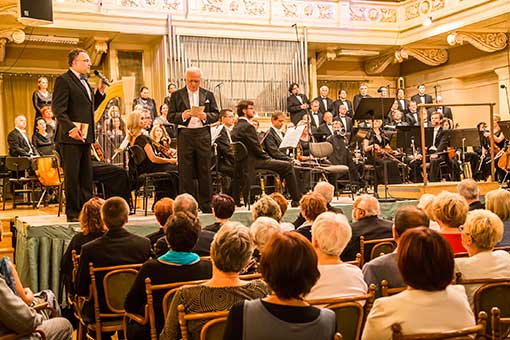 The first part of the evening offered two different Regina Coeli of Wolfgang Amadeus Mozart, namely in C (KV 108) and in B (KV 127). Gabriel Fauré’s Requiem (op. 48) was chosen for the second part. The cantatas of Mozart, both written for the text of the Marian hymn Regina Coeli, were an interpretive success for the choir and the accompanying PKF – Prague Philharmonia and – especially – for the soloist Hana Škarková. Mozart, who wrote both these cantatas when he was sixteen or seventeen while travelling across Italy with his father, prepared the ground for musicianship of the highest quality.
The first part of the evening offered two different Regina Coeli of Wolfgang Amadeus Mozart, namely in C (KV 108) and in B (KV 127). Gabriel Fauré’s Requiem (op. 48) was chosen for the second part. The cantatas of Mozart, both written for the text of the Marian hymn Regina Coeli, were an interpretive success for the choir and the accompanying PKF – Prague Philharmonia and – especially – for the soloist Hana Škarková. Mozart, who wrote both these cantatas when he was sixteen or seventeen while travelling across Italy with his father, prepared the ground for musicianship of the highest quality.
Škarková entered the first Mozart’s cantata Regina Coeli in C in its second movement. She excelled in typical Italian coloraturas and her solo parts were generally impressive. The passion of her performance was refined and precise at the same time. The observant and sharp audience could hear dramatic accentuation in some parts of the religious text, especially in the verses about the Resurrection of Christ. From the point of view of the acoustics, the choir, the organs (Martin Jakubíček) and the orchestra were balanced in any dynamic intensity; there was not a single unreadable musical passage. The vocal parts were firm in every situation. In the cheerful Hallelujah of the fourth movement, the choir and the orchestra picked up intensity and the performance of the first cantata gained its greatly exalting expression.
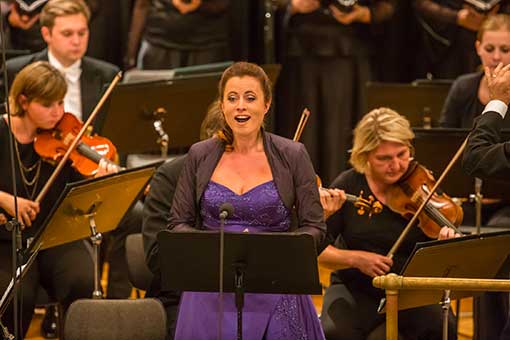 In Regina Coeli in B, the enthusiasm of the choir seemed to be even stronger than before. The sudden, strong, dynamic accents showed the utmost unity and in the long legatos the word resurrexit was stressed in an attractive way. The final Hallelujah seemed a bit tired at first, however, this feeling changed soon and the whole concert hall was feeling fresh and unwearied. Hana Škarková had an even greater part in the second cantata and her virtuosic solo was once again extraordinary. Both cantatas of Mozart were magnificently performed. One question remains, however, if there is any point on performing them one after the other as they can blend and mix up easily.
In Regina Coeli in B, the enthusiasm of the choir seemed to be even stronger than before. The sudden, strong, dynamic accents showed the utmost unity and in the long legatos the word resurrexit was stressed in an attractive way. The final Hallelujah seemed a bit tired at first, however, this feeling changed soon and the whole concert hall was feeling fresh and unwearied. Hana Škarková had an even greater part in the second cantata and her virtuosic solo was once again extraordinary. Both cantatas of Mozart were magnificently performed. One question remains, however, if there is any point on performing them one after the other as they can blend and mix up easily.
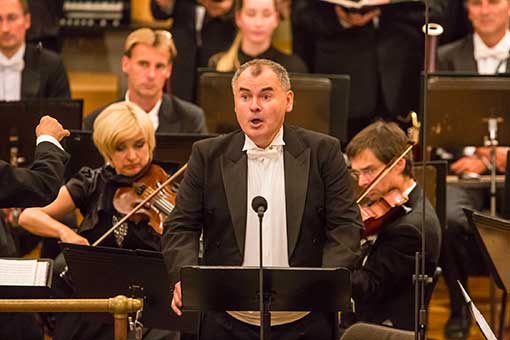 After a break, the orchestra with trombones this time came to accompany the vocalists in one of the most impressive compositions by Gabriel Fauré, i.e. the above mentioned Requiem, op. 48. The originally announced solo singer Igor Loškár had to be excused for his indisposition of voice and the choir member Tomáš Badura took his part then. Requiem, which Fauré did not compose for any specific person but “for fun and pleasure”, offered an emotionally colourful feast after the virtuosic music of Wolfgang Amadeus Mozart. Fauré did not follow the requiem liturgical pattern in the form of a requiem church service, but he composed a piece giving hope and consolation. The beginning of the composition was mysterious, the forte passages gave the audience the shivers and the quiet parts were played with a pleasing sensitivity by the trumpet player in the orchestra. The soft melodies of the female singers in the choir at the beginning of the second movement were enchanting and at the end the choir performed lyrical pianos in high pitch.
After a break, the orchestra with trombones this time came to accompany the vocalists in one of the most impressive compositions by Gabriel Fauré, i.e. the above mentioned Requiem, op. 48. The originally announced solo singer Igor Loškár had to be excused for his indisposition of voice and the choir member Tomáš Badura took his part then. Requiem, which Fauré did not compose for any specific person but “for fun and pleasure”, offered an emotionally colourful feast after the virtuosic music of Wolfgang Amadeus Mozart. Fauré did not follow the requiem liturgical pattern in the form of a requiem church service, but he composed a piece giving hope and consolation. The beginning of the composition was mysterious, the forte passages gave the audience the shivers and the quiet parts were played with a pleasing sensitivity by the trumpet player in the orchestra. The soft melodies of the female singers in the choir at the beginning of the second movement were enchanting and at the end the choir performed lyrical pianos in high pitch.
The third movement captivated with its special fusion of romantic and modern harmony typical of Fauré and his compositional education acquired from Camille Saint-Saën and César Franck. The French horns forte together with the organs contributed to the majestic character of the Sanctus part. In Pie Jesu, Hana Škarková was well heard due to the intensity and richness of her voice in spite of the quiet position. Unfortunately, the same cannot be said about Tomáš Badura in the second movement, who was not well heard in the quiet parts and neither were his pianos intensive. However, Badura was a decent replacement for Igor Loškár and his performance grew in intensity and colour with the increasing dynamic.
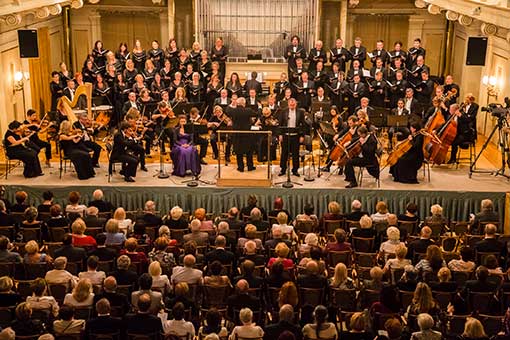 Agnus Dei might have seemed superficially appealing to the audience at first; nonetheless, it turned to chilling chromaticisms later which were handled with the utmost professionalism by the choir. In Libera me it was Tomáš Badura’s forte which appeared to be his better moments. The final part In paradisum began with a heavenly quaintness bringing catharsis to the concert itself – in the end, the programme did not end up being anywhere near as gloomy it may have seemed at first sight. Fauré’s Requiem is an impressive experience and the Czech Philharmonic Choir of Brno together with PKF – Prague Philharmonia and the solo singers performed the piece magnificently.
Agnus Dei might have seemed superficially appealing to the audience at first; nonetheless, it turned to chilling chromaticisms later which were handled with the utmost professionalism by the choir. In Libera me it was Tomáš Badura’s forte which appeared to be his better moments. The final part In paradisum began with a heavenly quaintness bringing catharsis to the concert itself – in the end, the programme did not end up being anywhere near as gloomy it may have seemed at first sight. Fauré’s Requiem is an impressive experience and the Czech Philharmonic Choir of Brno together with PKF – Prague Philharmonia and the solo singers performed the piece magnificently.
Wolfgang Amadeus Mozart: Regina coeli C dur, Regina coeli B dur, Gabriel Fauré: Requiem. Hana Škarková – soprano, Tomáš Badura– baritone, Martin Jakubíček – organ, PKF – Prague Philharmonia, the Czech Philharmonic Choir of Brno, conductor Petr Fiala. 6 September 2015, Besední dům, Brno.





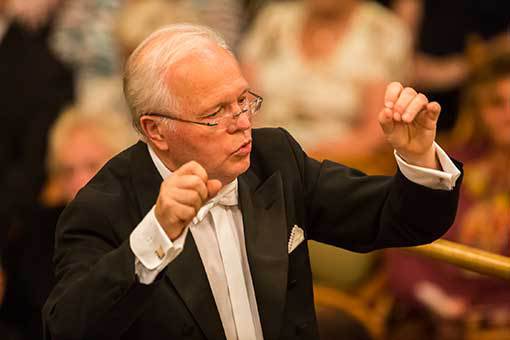



























No comment added yet..